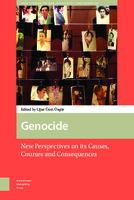Genocide
| dc.contributor.editor | Üngör, Ügür Ümit | |
| dc.date.accessioned | 2020-03-27 15:48:21 | |
| dc.date.accessioned | 2020-04-01T09:58:13Z | |
| dc.date.accessioned | 2019-10-23 23:55 | |
| dc.date.accessioned | 2020-03-27 15:48:21 | |
| dc.date.accessioned | 2020-04-01T09:58:13Z | |
| dc.date.available | 2020-04-01T09:58:13Z | |
| dc.date.issued | 2016 | |
| dc.identifier | 1005637 | |
| dc.identifier | OCN: 1135847262 | en_US |
| dc.identifier.uri | http://library.oapen.org/handle/20.500.12657/24478 | |
| dc.description.abstract | The twentieth century has been called, not inaccurately, a century of genocide. And the beginning of the twenty-first century has seen little change, with genocidal violence in Darfur, Congo, Sri Lanka, and Syria. Why is genocide so widespread, and so difficult to stop, across societies that differ so much culturally, technologically, and politically? [-]That's the question that this collection addresses, gathering a stellar roster of contributors to offer a range of perspectives from different disciplines to attempt to understand the pervasiveness of genocidal violence. Challenging outdated beliefs and conventions that continue to influence our understanding, Genocide constitutes a major contribution to the scholarship on mass violence.[-] | |
| dc.language | English | |
| dc.relation.ispartofseries | NIOD Studies on War, Holocaust and Genocide | |
| dc.subject.classification | thema EDItEUR::J Society and Social Sciences::JP Politics and government | en_US |
| dc.subject.other | Genocide | |
| dc.title | Genocide | |
| dc.type | book | |
| oapen.identifier.doi | 10.1515/9789048518654 | |
| oapen.relation.isPublishedBy | dd3d1a33-0ac2-4cfe-a101-355ae1bd857a | |
| oapen.relation.isFundedBy | da087c60-8432-4f58-b2dd-747fc1a60025 | |
| oapen.relation.isbn | 9789089645241 | |
| oapen.collection | Dutch Research Council (NWO) | |
| oapen.pages | 282 | |
| oapen.place.publication | Amsterdam | |
| oapen.identifier.ocn | 1135847262 |

